
Even mild hearing loss can substantially impact daily life, affecting interactions with friends, family, and colleagues, as well as complicating regular tasks such as grocery shopping. But transformative changes can be brought about by the use of correctly tuned hearing aids.
Ten reasons why you should consider hearing aids
While the primary advantage of hearing aids is obvious, improved hearing, their impact extends far past mere auditory enhancement. Let’s investigate the comprehensive advantages that using hearing aids can offer.
Improved relationships and communication
Clear communication is the basis of meaningful relationships. Neglected hearing loss frequently leads to missed conversations and misunderstandings, which can strain relationships. Hearing aids enable you to fully participate in conversations, enhancing your ability to interact with others and decreasing feelings of separation or disappointment.
Enhanced independence
Simple tasks like shopping or going out for dinner can become challenging with untreated hearing loss, as barriers to communication may develop. Hearing aids empower you to navigate these situations independently by improving your ability to hear and understand speech in various environments. Having a greater sense of independence will help you do things that require improved situational awareness such as driving, for instance.
Prospect of higher income
Reliable communication is key when you’re working in professional situations. Your job performance and career advancement can be diminished by untreated hearing loss which can impact how you take part in meetings and other work-associated gatherings. You can boost your productivity, which can, in turn, lead to career opportunities, by using hearing aids to stay more alert and engaged.
Decreased tinnitus symptoms
Tinnitus, which is a ringing in the ear, commonly accompanies hearing loss. Hearing aids can offer relief from tinnitus for some individuals by masking symptoms.
Cognitive decline can be mitigated
Some research has revealed a connection between untreated hearing loss and mental decline, including dementia. It’s possible that using hearing aids to treat neglected hearing loss can decrease the chance of cognitive impairment and help maintain the overall health of the brain.
The enjoyment of music
Hearing loss can distort the perception of music, making it less pleasurable. The depth and richness of musical sounds can be restored by hearing aids which fill in the gaps in frequency so you can take pleasure in your favorite songs once more.
Increased confidence
Whether you’re in a social or professional situation, being able to hear better will give you more confidence. With increased communication abilities, you’ll feel more self-assured and competent, improving your general quality of life.
Having more energy
Neglected hearing loss pushes the brain to work extremely hard to fill in missing sound which can be mentally exhausting. Hearing aids reduce this strain, giving you mental relief and allowing you to enjoy activities without feeling constantly tired.
Increased safety and awareness
Awareness of one’s surroundings is essential for safety, whether it’s crossing the street or driving a vehicle. Environmental sounds can be restored by hearing aids, ensuring that your response to things like alarms and approaching vehicles is safe and correct.
Establishing a positive example
Choosing to wear hearing aids displays a proactive approach to health and well-being, establishing a positive example for other people facing similar difficulties. It inspires people around you by showing a commitment to personal improvement and growth.
Get your hearing tested today
While the primary advantage of hearing aids is to enhance auditory perception, the ripple effects on other aspects of life are powerful. Hearing aids are a positive step to an improved quality of life, whether that means greater independence, stronger cognitive health, enhanced relationships, or a combination of these.
Schedule an appointment for a hearing exam today and take the initial steps to better hearing.

